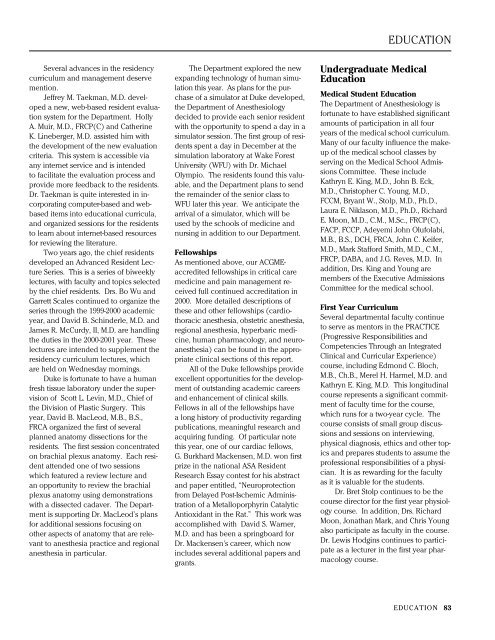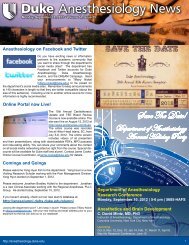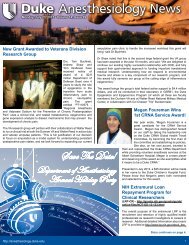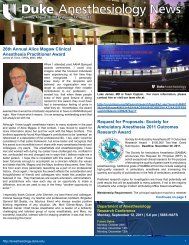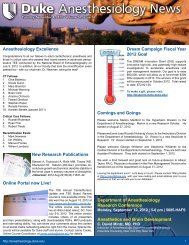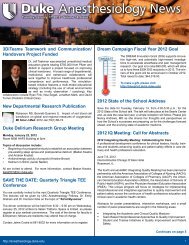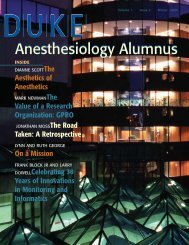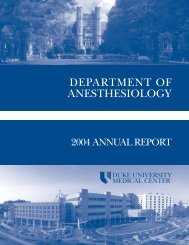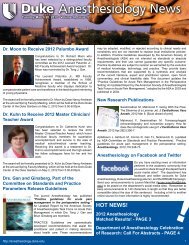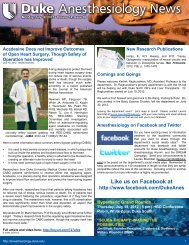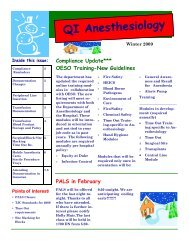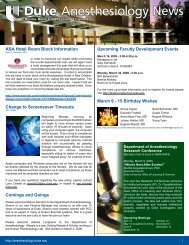DEPARTMENT OF ANESTHESIOLOGY ANNUAL REPORT
DEPARTMENT OF ANESTHESIOLOGY ANNUAL REPORT
DEPARTMENT OF ANESTHESIOLOGY ANNUAL REPORT
Create successful ePaper yourself
Turn your PDF publications into a flip-book with our unique Google optimized e-Paper software.
Several advances in the residency<br />
curriculum and management deserve<br />
mention.<br />
Jeffrey M. Taekman, M.D. developed<br />
a new, web-based resident evaluation<br />
system for the Department. Holly<br />
A. Muir, M.D., FRCP(C) and Catherine<br />
K. Lineberger, M.D. assisted him with<br />
the development of the new evaluation<br />
criteria. This system is accessible via<br />
any internet service and is intended<br />
to facilitate the evaluation process and<br />
provide more feedback to the residents.<br />
Dr. Taekman is quite interested in incorporating<br />
computer-based and webbased<br />
items into educational curricula,<br />
and organized sessions for the residents<br />
to learn about internet-based resources<br />
for reviewing the literature.<br />
Two years ago, the chief residents<br />
developed an Advanced Resident Lecture<br />
Series. This is a series of biweekly<br />
lectures, with faculty and topics selected<br />
by the chief residents. Drs. Bo Wu and<br />
Garrett Scales continued to organize the<br />
series through the 1999-2000 academic<br />
year, and David B. Schinderle, M.D. and<br />
James R. McCurdy, II, M.D. are handling<br />
the duties in the 2000-2001 year. These<br />
lectures are intended to supplement the<br />
residency curriculum lectures, which<br />
are held on Wednesday mornings.<br />
Duke is fortunate to have a human<br />
fresh tissue laboratory under the supervision<br />
of Scott L. Levin, M.D., Chief of<br />
the Division of Plastic Surgery. This<br />
year, David B. MacLeod, M.B., B.S.,<br />
FRCA organized the first of several<br />
planned anatomy dissections for the<br />
residents. The first session concentrated<br />
on brachial plexus anatomy. Each resident<br />
attended one of two sessions<br />
which featured a review lecture and<br />
an opportunity to review the brachial<br />
plexus anatomy using demonstrations<br />
with a dissected cadaver. The Department<br />
is supporting Dr. MacLeod’s plans<br />
for additional sessions focusing on<br />
other aspects of anatomy that are relevant<br />
to anesthesia practice and regional<br />
anesthesia in particular.<br />
The Department explored the new<br />
expanding technology of human simulation<br />
this year. As plans for the purchase<br />
of a simulator at Duke developed,<br />
the Department of Anesthesiology<br />
decided to provide each senior resident<br />
with the opportunity to spend a day in a<br />
simulator session. The first group of residents<br />
spent a day in December at the<br />
simulation laboratory at Wake Forest<br />
University (WFU) with Dr. Michael<br />
Olympio. The residents found this valuable,<br />
and the Department plans to send<br />
the remainder of the senior class to<br />
WFU later this year. We anticipate the<br />
arrival of a simulator, which will be<br />
used by the schools of medicine and<br />
nursing in addition to our Department.<br />
Fellowships<br />
As mentioned above, our ACGMEaccredited<br />
fellowships in critical care<br />
medicine and pain management received<br />
full continued accreditation in<br />
2000. More detailed descriptions of<br />
these and other fellowships (cardiothoracic<br />
anesthesia, obstetric anesthesia,<br />
regional anesthesia, hyperbaric medicine,<br />
human pharmacology, and neuroanesthesia)<br />
can be found in the appropriate<br />
clinical sections of this report.<br />
All of the Duke fellowships provide<br />
excellent opportunities for the development<br />
of outstanding academic careers<br />
and enhancement of clinical skills.<br />
Fellows in all of the fellowships have<br />
a long history of productivity regarding<br />
publications, meaningful research and<br />
acquiring funding. Of particular note<br />
this year, one of our cardiac fellows,<br />
G. Burkhard Mackensen, M.D. won first<br />
prize in the national ASA Resident<br />
Research Essay contest for his abstract<br />
and paper entitled, “Neuroprotection<br />
from Delayed Post-Ischemic Administration<br />
of a Metalloporphyrin Catalytic<br />
Antioxidant in the Rat.” This work was<br />
accomplished with David S. Warner,<br />
M.D. and has been a springboard for<br />
Dr. Mackensen's career, which now<br />
includes several additional papers and<br />
grants.<br />
EDUCATION<br />
Undergraduate Medical<br />
Education<br />
Medical Student Education<br />
The Department of Anesthesiology is<br />
fortunate to have established significant<br />
amounts of participation in all four<br />
years of the medical school curriculum.<br />
Many of our faculty influence the makeup<br />
of the medical school classes by<br />
serving on the Medical School Admissions<br />
Committee. These include<br />
Kathryn E. King, M.D., John B. Eck,<br />
M.D., Christopher C. Young, M.D.,<br />
FCCM, Bryant W., Stolp, M.D., Ph.D.,<br />
Laura E. Niklason, M.D., Ph.D., Richard<br />
E. Moon, M.D., C.M., M.Sc., FRCP(C),<br />
FACP, FCCP, Adeyemi John Olufolabi,<br />
M.B., B.S., DCH, FRCA, John C. Keifer,<br />
M.D., Mark Stafford Smith, M.D., C.M.,<br />
FRCP, DABA, and J.G. Reves, M.D. In<br />
addition, Drs. King and Young are<br />
members of the Executive Admissions<br />
Committee for the medical school.<br />
First Year Curriculum<br />
Several departmental faculty continue<br />
to serve as mentors in the PRACTICE<br />
(Progressive Responsibilities and<br />
Competencies Through an Integrated<br />
Clinical and Curricular Experience)<br />
course, including Edmond C. Bloch,<br />
M.B., Ch.B., Merel H. Harmel, M.D. and<br />
Kathryn E. King, M.D. This longitudinal<br />
course represents a significant commitment<br />
of faculty time for the course,<br />
which runs for a two-year cycle. The<br />
course consists of small group discussions<br />
and sessions on interviewing,<br />
physical diagnosis, ethics and other topics<br />
and prepares students to assume the<br />
professional responsibilities of a physician.<br />
It is as rewarding for the faculty<br />
as it is valuable for the students.<br />
Dr. Bret Stolp continues to be the<br />
course director for the first year physiology<br />
course. In addition, Drs. Richard<br />
Moon, Jonathan Mark, and Chris Young<br />
also participate as faculty in the course.<br />
Dr. Lewis Hodgins continues to participate<br />
as a lecturer in the first year pharmacology<br />
course.<br />
EDUCATION 83


